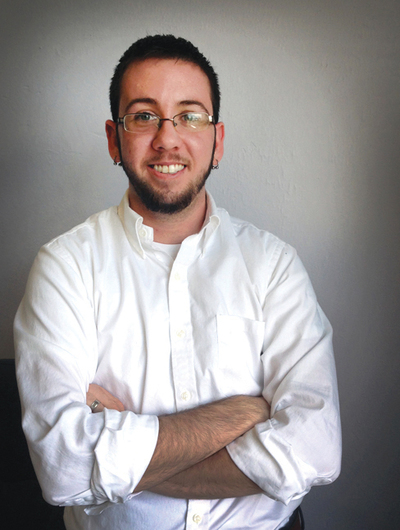Navigating the Election: Artists and Activists Respond

Mason Dunn. Photo courtesy MTPC.
By Olivia J. Kiers
In the wake of the recent presidential election, after protracted and divisive campaigning, Art New England is posting a series of discussions with New England artists, activists, and cultural operators. How is the current political climate affecting them? How are our cultural and advocacy organizations navigating the events that shocked a nation and the world?
To start our series, Mason Dunn, executive director of the Massachusetts Transgender Political Coalition (MTPC), talks about the transgender community, identity politics, and the role the arts play in our lives.
Art New England: Leading up to the election, many issues regarding identity were discussed. What were the key moments during the campaign that were particularly meaningful for the transgender community?
Mason Dunn: There are so many moments that I could speak to. For the larger LGBT community, specifically the trans community, the appointment of Mike Pence as [Donald Trump’s] vice presidential pick was a moment of gut-wrenching reality. Prior to that, president-elect Trump had not made many statements about LGBTQ identity. The few statements he had made were of questionable support at best, but not really the kind of response that we saw from Hillary Clinton, or Bernie Sanders, for that matter. With the selection and appointment of Mike Pence, things really became clearer about where this administration would be on issue of LGBTQ identity, because Pence has such a history of adversity to LGBTQ identities and rights. That was a moment of concern that has only continued to grow as more appointments after the election have come out.
ANE: Has MTPC’s activism surrounding certain issues changed post-election?
MD: I would say we are not using the same tactics. We have similar priorities and of course we have the same foundation of our mission and goals for transgender rights, specifically. But the ideas about what we can do and what we will need to prioritize moving forward have changed a little bit. There are concerns for many of the advances that were made in the last eight years under the Obama Administration now coming into question.
Now, I don’t think that LGBTQ rights will be the first thing on the agenda for the next administration. But there are things that will happen—for instance, the Supreme Court nomination—that will have serious ramifications for the LGBTQ community… With the Supreme Court nomination of someone who might not support trans rights, we will then possibly have a Supreme Court decision that is against trans identity coming out in the next four years, and that will be a major blow to larger progress at a national level.
ANE: This election has been called one of the most divisive in recent American history, and now there are just as many calls for unity as there are for protest. Can you discuss how these two, very different post-election approaches might resonate (or not) with the transgender community?
MD: I have to agree that this election has been pretty divisive, and there’s been a lot of “Monday morning quarterbacking” of who is to blame for the state that we find ourselves in. There have been statements that identity politics is to blame, and that these focuses on immigration, LGBTQ rights and women’s rights drove people away from more progressive candidates… That is a major concern for the future of progressive movements and social justice broadly.
Although this was divisive in so many ways, organizations of progressive social justice advocates need to come together. At MTPC, we approach our work with an eye toward anti-oppression. What we have to understand is that oppressions in the world around us—whether they be racism, misogyny, transphobia, able-ism or age-ism—are all interwoven and interlinked. We have to work on them all together, or else we will find ourselves siloed and, quite frankly, ineffectual.
ANE: Have you witnessed a response from transgender artists, writers, musicians or performers about the campaign, the election and its results?
MD: A week after the election we hosted an event that was focused on trans identities in art in Cambridge… That moment for me really clarified the fact that artwork is inherently political. Whether you are painting, singing, writing poetry [or] performing spoken word, there is a political element to it. It really became clear that evening when… art helped us to channel some of our fears and concerns, as well as our solidarity with one another, through poetry and music. It felt very cathartic to express ourselves that evening.
ANE: If you could send one message to artists right now, what would it be?
MD: My message would be the same for artists as for activists, which is: “Don’t stop.” Many people want to give up. I think it’s important to us to come together and not stop what we do. Our passions drive us and pull us together. That’s the only way we are going to continue the work that needs to be done.
